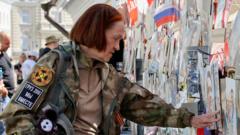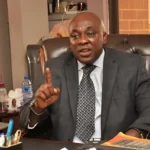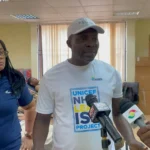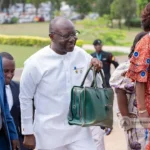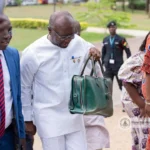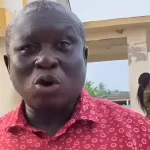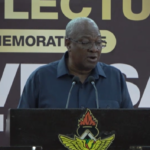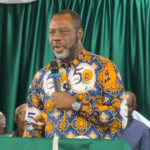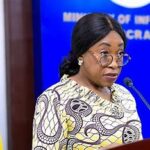As Ukraine’s foreign minister completes his latest tour of Africa, his country risks paying a serious diplomatic price for helping separatist rebels in northern Mali inflict a severe defeat on the Russian military operator Wagner at the end of last month.
The ambush at Tinzaouten on 27 July reportedly killed 84 Wagner fighters and 47 Malian soldiers.
It was a painful military blow for the mercenary outfit once headed by the late Yevgeny Prigozhin, but now controlled by Russia’s official defence command structure.
Just two days later Andriy Yusov, spokesman for Kyiv’s military intelligence service (GUR), said that ethnic Tuareg rebels in Mali had “received necessary information, and not just information, which enabled a successful military operation against Russian war criminals”.
Subsequent reports suggested that Ukrainian special forces had trained the separatists in the use of attack drones.
Yet for many Africans, this was yet another case of outside powers exploiting the continent as a bloody playing field for their own rivalries.
Predictably, Mali’s ruling military junta, and the allied regime in neighbouring Niger, protested by breaking off diplomatic relations with Kyiv.
But much more significant was a statement from the regional bloc, the Economic Community of West African States (Ecowas). Despite its own diplomatic issues with the military regimes in Mali, Niger and Burkina Faso, it was clear in its rebuke.
It declared its “firm disapproval and firm condemnation of any outside interference in the region which could constitute a threat to peace and security in West Africa and any attempt aiming to draw the region into current geopolitical confrontations”.
The anger will have been strengthened by suggestions that some jihadist militants joined the Tuareg separatists in mounting the Tinzaouaten attack.
The Senegalese foreign ministry summoned the Ukrainian ambassador in Dakar to protest after he posted a Facebook video about Mr Yusov’s gloating comments.
Ukrainian Foreign Minister Dmytro Kuleba was touring Malawi, Zambia and Mauritius last week. But after the harsh words from Ecowas and Senegal he may now have to engage in some serious fence-mending in West Africa.
What many sub-Saharan African governments – even those that privately mistrust Moscow – will probably view as Kyiv’s unhelpful outside military adventurism could dispel the goodwill so painstakingly cultivated over the past two years through peaceful Ukrainian diplomacy.
Of course in narrow military terms, helping to inflict the heaviest-ever African defeat on Wagner was a success for the Ukrainians.
The mercenary contractor – now officially renamed Corps Africa after being brought under Russian state control – had doubled its manpower to an estimated 2,000 in Mali over the past two years.
So news of the heavy losses in Tinzaouaten came as a shock, particularly given that the Malian army and Wagner forces had seized Kidal, the Tuareg rebel “capital”, last November.
The Tinzaouaten incident has signalled the separatists’ return to the offensive –with, it soon became clear, the support of a new partner.
Kyiv’s hints of direct involvement confirm how far it is prepared to reach in taking its fightback against Russia’s President Vladimir Putin well beyond the home battlefield.
In fact this is not the first such direct intervention against Wagner military operations in Africa.
There were strong indications that last August and September Ukrainian special forces carried out drone raids in Sudan in support of the military regime led by General Abdel Fattah al-Burhan.
For more than a year, it has been engaged in a brutal power struggle with its former allies the paramilitary Rapid Support Forces (RSF) led by Gen Mohamed Hamdan Dagalo, better known as “Hemedti”, who has been assisted by Wagner.
Some Ukrainian military commentators, such as Evgeniy Dikiy, former commander of Ukraine’s Aidar battalion, depict their country’s reported African military interventions very much in terms of a battle for survival after Russian forces invaded in February 2022.
Mr Dikiy has argued that Kyiv has no Africa policy but does have scores to settle with Russia and Wagner in particular.
But the administration of Ukrainian President Volodymyr Zelensky may not see things in quite such simplistic terms.
For it knows that the fightback against Moscow is not only conducted on the battlefield. Diplomacy and trade matter too.
And in the immediate aftermath of the 2022 invasion, Kyiv was painfully reminded of this truth, particularly in regards to Africa.
In the UN General Assembly on 2 March that year, only 28 of the 54 African member states voted to condemn the invasion.
While only a few close allies of Moscow actually voted in support of Russia’s action, many other African governments, including some generally perceived as firmly pro-Western, actively abstained or absented themselves from the vote.
And later, when President Putin pulled out of the deal allowing both Ukrainian and Russia grain exports – many destined for Africa – to safely transit through the Black Sea, many sub-Saharan governments chose to view this setback in neutral terms rather than blaming Moscow.
While that particular issue has faded in significance, because Ukraine has largely recovered its freedom to ship grain after striking the Russian Black Sea fleet, the foreign ministry team in Kyiv has remained convinced of the need to rebuild their political and economic networks across Africa.
Mr Kuleba has now made four African tours. And while his campaign to earn goodwill and build partnerships south of the Sahara has not always advanced without a hitch – hopes of being received by President Cyril Ramaphosa during a visit to South Africa late last year were disappointed – there have also been important successes.
Zambia, for example, attended the Ukraine Peace Summit in Switzerland in June and, unlike some other participants, did sign the final communiqué (whose terms satisfied Kyiv).
And last week Mr Kuleba visited the Zambian capital, Lusaka, where he was received by President Hakainde Hichilema.
In reaching out to African countries now, Ukraine is seeking to make up for the diplomatic ground lost during the first three decades after its independence when it was largely preoccupied with its internal affairs.
While Russia inherited the worldwide diplomatic presence of the old Soviet Union, newly independent nations such as Ukraine had to build up their networks from scratch.
With limited resources, over 30 years Kyiv managed to open only eight embassies across the entire African continent – in Algeria, Angola, Egypt, Ethiopia, Kenya, Nigeria, Senegal and South Africa.
But after being so uncomfortably reminded in 2022 of the need to win friends and influence people, Kyiv is pushing rapidly to expand its coverage, aiming to build a 20-embassy African network, with the first 10 extra missions already announced.
April saw Kyiv’s special envoy for the Middle East and Africa, Maksym Soubkh, in Abidjan to open the embassy in Ivory Coast.
And Kyiv is proposing more than diplomatic co-operation.
Eight sub-Saharan countries have already benefitted from its “Grain from Ukraine” food aid initiative.
It also plans to build up its development assistance, strengthen two-way trade and provide more university places for African students.
Contentious military adventures targeting Russian mercenaries look an ill-judged risk that could jeopardise all the diplomatic goodwill and economic returns that Ukraine hopes to gain from its broad-based positive sub-Saharan strategy.
Paul Melly is a consulting fellow with the Africa Programme at Chatham House in London.
Go to BBCAfrica.com, external for more news from the African continent.
Follow us on Twitter @BBCAfrica, external, on Facebook at BBC Africa, external or on Instagram at bbcafrica, external

